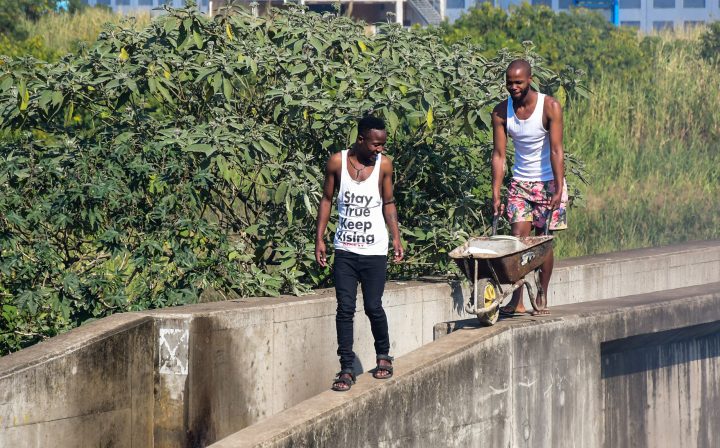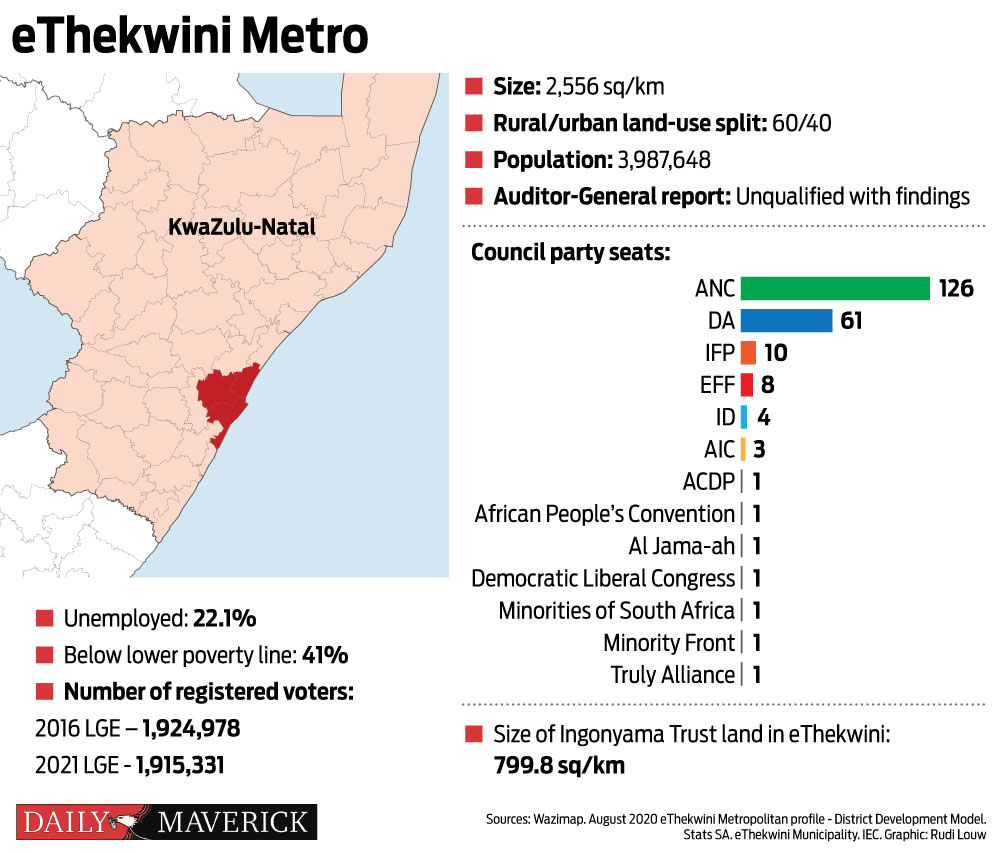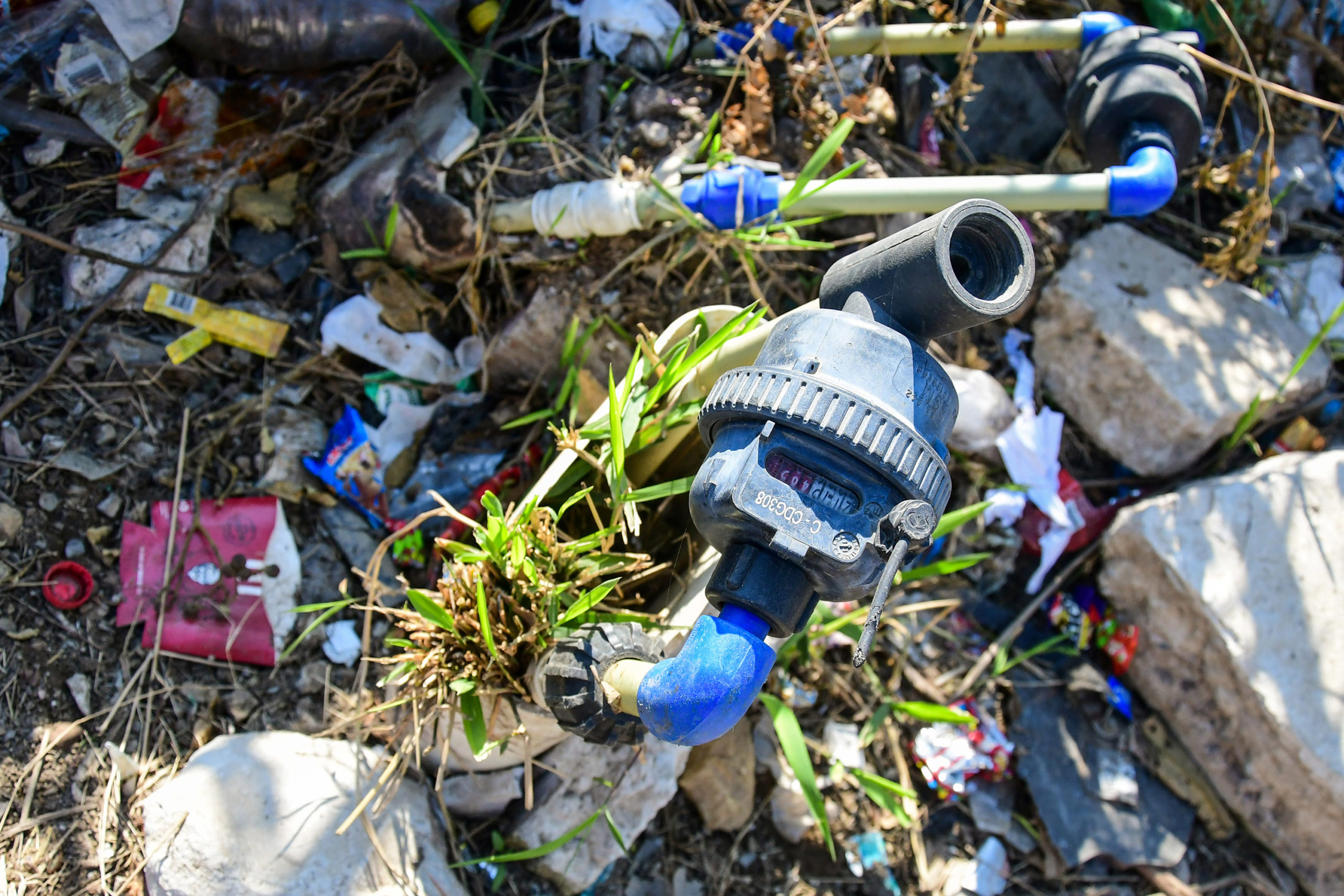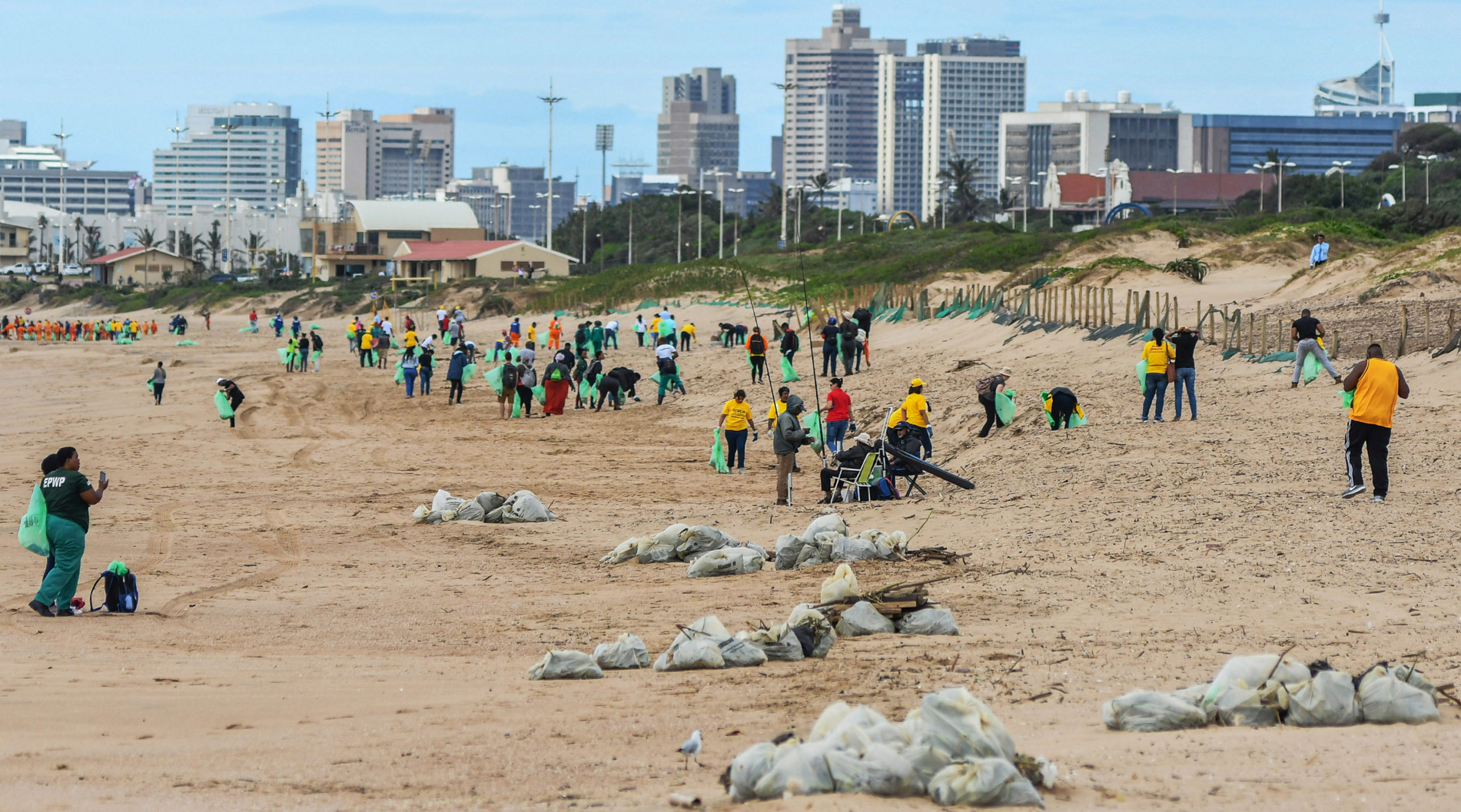2021 ELECTIONS: STATE OF OUR CITIES
eThekwini Metro (Part One): Broken pumps, faulty valves and hundreds of leaks a day — Durban’s ramshackle water supply

eThekwini municipality, the metro punted by the African National Congress-led provincial and local government as the prime investment destination in KwaZulu-Natal, has allowed water infrastructure — and planning for increased capacity — to lapse to such an extent that it experiences about 300 leaks a day.
eThekwini municipality has seen a flurry of activity in September and October — just ahead of the 1 November local government elections — as politicians in expensive cars huff and puff around the metro to launch “new” programmes that should have been implemented years ago to ease the burden on overstretched and underserviced ratepayers — and to attract much-needed investment.
In April, while appearing before Parliament’s cooperative governance oversight committee, Durban’s water and sanitation head Ednick Msweli told MPs that the city experienced “about 400 leaks a day”.
City officials have since confirmed to Daily Maverick that the number is closer to 300.
A hundred or so costly leaks aside, Msweli told the committee that he conducted an interesting benchmarking exercise between eThekwini and Japan, saying: “I mean, it is a first-world country, but the number of faults we do in a day, Japan does in one year.”
Msweli continued: “We do close to 400 or so… I may not have the correct number. That tells you how many times a day our pipes burst — about 400 times, in 400 different places, and that’s just because of the age of the infrastructure.”
The municipality’s ageing infrastructure is no secret, and warnings have been sounded for years about the consequences of poor planning. The number of leaks the city has to attend to daily, however, remains staggering.

Raw sewage at Big Jo’s eatery during an eThekwini municipal clean-up campaign on 14 September 2021. The clean-up operation forms part of the ‘Operation Good Hope’ initiative that seeks to rid the city of grime, filth and lawlessness. (Photo: Gallo Images / Darren Stewart)
Read here from our archives: City of eThekwini’s answers to questions about weeks-long water cuts run dry.
Last month the Democratic Alliance, the official opposition in the metro, said that eThekwini had suffered water losses of more than 54% in August.
“This means the municipality is losing more water than it sells, resulting in revenue losses amounting to hundreds of millions in much-needed revenue.”
In another series of own goals that directly affects service delivery, the city is known for allowing contracts to lapse. In the case of the water and sanitation department, Msweli told the same Cogta committee that some of its “important” supply contracts for materials had expired. “Our SCM unit is working tirelessly to put in place some stopgap measures, doing a number of Section 36s, to make sure we have the material to do repairs.”
While work was being done on the stopgap contracts, SCM was also working on three-year contracts to ensure that “we never have the same problem again”, Msweli said.

Daily Maverick readers will be well versed in the abuse of Section 36 of the Municipal Finance Management Act’s Supply Chain Management Regulations for procurement processes, which allow for a deviation from normal tender processes in the case of emergencies, or when it is not practical to go out to tender. It is through the abuse of Section 36 that fraud and corruption are able to thrive.
A report by eThekwini’s audit committee last year, focusing on the city’s fourth-quarter performance ending in June 2020, found that its water and sanitation unit had incurred irregular expenditure of R153.5-million, a position the unit held a year earlier, with irregular expenditure topping R146.7-million. The report also found that the same department had incurred R92.2-million in unauthorised expenditure.
Audit committee chairperson Nalo Mhlongo told Exco at the time that “a bigger portion of the [overall] irregular expenditure was due to poor planning”.
An audit review on Section 36 awards by the city for the period October 2019 to January 2020 found the reports submitted to the bid adjudication committee (BAC) did not contain detailed and comprehensive reasons or motivations for the deviations, and that the BAC’s decision-making process was “compromised”.
It was found in many instances that Section 36 was used where the deviations were due to lack of adequate planning or contract management. “The city has also not developed a strategy to deal with interferences from the business forums and community protests, which result in additional contract costs and delays in completion of projects, thereby requiring the use of Section 36,” according to the review.
The challenges experienced by his department in past financial years, Msweli told the Cogta committee, included “running out of budgets constantly” in the final quarters.
“We analysed the reasons for this and saw some inefficiencies that need to be improved, and we have implemented serious controls… since then we have seen savings on expenditure on maintenance. But as I said earlier, the infrastructure is old and failing.”
When Daily Maverick asked for an update on contracts, we were told: “All maintenance contracts are in place for the provision of mechanical and electrical, maintenance services to water and wastewater, and wastewater facilities including all pump stations.”
Water interruptions are not uncommon in eThekwini. In one of the latest just last week, seven areas north of Durban experienced interruptions which the city said were the result of load shedding and “technical issues” at one of its treatment works, as well as another system.
It was a struggle to fill reservoirs, which were being worked on by technicians between 10am and 3pm. Water was expected to be fully restored only two days later.
In September, there was an interruption of water supply in 10 areas to the south of the city due to a “faulty valve”. The intermittent supply stretched as far as the northern part of the Ugu District Municipality.
In one of the more disturbing incidents in January, broken pump motors at the city’s Northdene station led to outages in several southern and western suburbs that lasted from 6-15 January in some parts, and up to 21 January in others. This was while eThekwini was fighting its second wave of Covid-19.
Daily Maverick used detailed ward census data from the 2011 National Census for the affected areas in January, and applied the city’s yearly population growth to those numbers. On a conservative estimation, about 70,000 people could have been affected by the water interruptions, but local activists claimed the number was far higher and could be in the hundreds of thousands. A precise figure is difficult to calculate due to water infrastructure not following municipal ward demarcations.
As is standard, water tankers were sent to the affected areas, but even there, abuse was a problem.

A water meter in Lamontville, Durban. (Photo: Gallo Images / Darren Stewart)
A month before the January outage, when responding to briefings made by various senior managers about audit findings against their departments, mayor Mxolisi Kaunda said there was an urgent need to “expedite” the implementation of tracking systems in water tankers.
“You would rather spend money to monitor people (drivers) than to have the situation that we have, where they can just drive anywhere to go and sell water instead of servicing communities which are in dire need. It is important that this is expedited. It is one issue that needs to be addressed. With no close monitoring, the element of abuse will always take precedence over delivery of water,” Kaunda said.
As for load shedding, Msweli estimates that two hours without power means it can take up to seven days for water infrastructure to return to full capacity in some parts of the city. To try to circumvent this, an agreement was made with the electricity unit that during Stage 2 load shedding, eThekwini’s largest water works — Durban Heights — would be exempted. Should the load shedding move beyond Stage 2, “we would have a problem”, according to Msweli.
Earlier this month, the city held an event to introduce to the Chatsworth community the contractor who would be replacing water reticulation pipes and ancillary works in three wards. And in September, a contractor was introduced to the outer west community of Umgeni. That contractor is set to undertake a multimillion-rand expansion of the KwaMkhizwana Water Treatment Works.
On 6 October, the city launched its “new smart metering system” to reduce “glitches” in its billing system by allowing water and electricity meter readings to be automatically uploaded. Exorbitant water and electricity bills for standard usage are not uncommon in the metro.
At the same Cogta meeting, Msweli said the smart metering system would be the “silver bullet” when it came to water billing issues.
He said that although the original billing system was now stable, “what needs to be fixed is what goes into the billing system. On the water side, we are working on a meter reading platform. The current way we read meters is that we send out a meter reader, he reads, and you just have to trust that the reading is correct”.
Msweli said the system would allow the city to confirm the non-renewable water figure, and calculate water sales to customers and what is being bought from Umgeni Water. “We have 100% confidence, or close to that, on what we are buying from Umgeni, but we don’t have the same level of confidence on what we are selling.”
Some of the city’s woes are the result of missteps that took place when former mayor, the since criminally charged Zandile Gumede, led eThekwini from 2016. But the water and sanitation department has been a hotbed of corruption for at least a decade, with numerous officials implicated in receiving bribes.
In September 2020, the Hawks raided several properties belonging to contractors and city officials from the department who are allegedly linked to a multimillion-rand, decades-long ablution roll-out project for impoverished communities. The alleged tender racket saw contractors paid without doing any work and the officials getting their cut. The Hawks have estimated that the amount siphoned off sits at around R700-million.
Dirty beaches with raised E. coli levels
While the city may claim to be getting on top of its water and sewerage “challenges”, the lack of a coherent and consistent maintenance programme has seen rising levels of E. coli in the local rivers that discharge into the ocean.
See Our Burning Planet report here: eThekwini declares some beaches safe after reduction in e-coli levels following sewage leak.
In late September, Durban had to temporarily close its Golden Mile beaches and nearby river systems, which continued into the Heritage Day long weekend, after malfunctioning pumps led to higher levels of E. coli being detected. The city blamed vandalism at the time.
Heightened levels of E. coli in eThekwini’s sea are not a new phenomenon. Municipal spokesperson Msawakhe Mayisela told Daily Maverick that since 2016, swimming had to be banned about twice a year because of increased E. coli levels.
The city beaches of Ushaka, North and Point currently have Blue Flag status (Blue Flag measures, among other criteria, E. coli and streptococcus bacterial loads) and are likely to retain it, with South Beach having pilot status.
It is the beaches on either side of the polluted Umgeni River that remain a problem, such as Snake Park and Battery Beach to the south of the river, in front of the derelict former Natal Command army headquarters. Dozens of bathers who used this beach fell ill in early September, with E. coli suspected.
Here, it is not uncommon to find garbage in the sea and on the sand, including nappies, needles, sanitary towels as well as plastic and beer bottles.
In the wetlands adjacent to the Umgeni River and near the finish line of the annual Duzi canoe marathon, large volumes of household rubbish brought down by the river litter the marshland. During heavy rainfall, the trash and human waste from informal settlements flows into the ocean and washes up on the shoreline.

eThekwini Municipality’s Parks, Recreation and Culture Unit embarks on a clean-up operation at Blue Lagoon Beach on 27 January 2020. After heavy downpours in November and December 2019 an avalanche of inland litter made its way down watercourses to the ocean. Blue Lagoon was on the receiving end of the threat to marine life and beaches. (Photo by Gallo Images / Darren Stewart)
Tourists and residents wanting to avoid this unsightly mess previously had the option of travelling to beaches to the north, such as the Blue Flag Umhlanga and Umdloti, which has pilot status, but these remain closed since the UPL chemical spill that occurred after the torching of the warehouse in the July riots.
Since some of the more popular northern beaches are closed and many of the city beaches are dirty, some out-of-season holidaymakers and residents have had to settle for smaller beaches to the south, such as Amanzimtoti and Warner Beach.
But in Amanzimtoti, the appalling state of the ablutions and facilities means it is highly unlikely to retain its Blue Flag status.
The latest successful South African Blue Flag beaches will be launched in Hermanus on 27 October.
The eThekwini metro is busy with a scoping and costing exercise for its ambitious sewer pipe replacement programme that is expected to run over 10 years. The aim is to replace all sewer pipes more than 60 years old as well as those in areas where repeated faults are experienced.
Msweli told the Cogta committee that the city embarked on its water pipe replacement programme “a while ago”. “Here, the city spent close to R2-billion replacing all cement pipes,” he said.
As for the sewer pipe replacement programme, the city told Daily Maverick that “[t]he estimated cost is R1-billion. It is not in the current budget but will be allowed for in the infrastructure levy that comes into effect next financial year, or other financial sources. This will kick-start the detailed scoping and costing of the project by the appointed programme managers.”
That infrastructure levy, set to run over three years, has resulted in an extra R1.50/kl for water and R1.50/kl for sewage disposal. DM
Watch out for Part Two of the State of eThekwini this week.
[hearken id=”daily-maverick/8775″]















 Become an Insider
Become an Insider
Yep, Durb’s deserves the incompetence it votes for. Very soon it will be equal to the thilthy-Maritzburg. How technically difficult can it be to keep and city clean? Apparently, it’s rocket science.
If you read the News24 report today, Durban is the country’s best performing Metro
Just shows you how low the standards are for municipalities, I have not seen the News 24 report, but did they also give the accolade for best mayor to Zandile Gumede?
That report is obviously flawed. How Durban got the top spot is a mystery. Ask Adriaan Basson how an underspend on a financial plan is a positive entry, powerful enough to put Durbs above Cape Town!